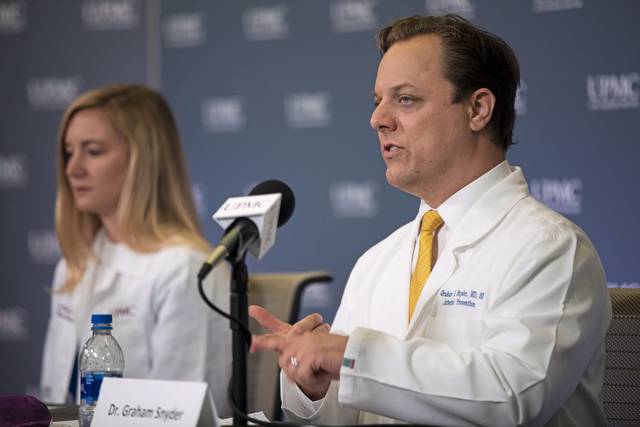UPMC expanding covid antibody treatment
UPMC will expand access to monoclonal antibody treatment across all its facilities, including urgent care centers, leaders announced Tuesday as they continue to implore the public to get vaccinated, wear masks and stay distanced.
The expansion means the monoclonal antibodies will be used as a preventive measure: they will be given to patients exposed to covid-19 who are at a high risk of developing the virus in a severe way.
That includes those who are not vaccinated, who are only partially vaccinated, are less than two weeks out from their final dose and who are vaccinated but have high-risk conditions or compromised immune systems.
“What it means to be eligible is, first and foremost, you must be exposed to someone with covid-19,” said Dr. Erin McCreary, an infectious disease pharmacist.
The announcement comes as the Food and Drug Administration expands its emergency use authorization for the Regeneron monoclonal antibody treatment. The idea is parallel to using monocolonal antibodies to treat very ill patients – the antibodies attach to the virus and help one’s immune system respond. In using the treatment after an exposure to the virus, the goal is keep the virus from progressing into a severe case in those who are at a high risk.
The emphasis, however, remains on getting vaccines to as many people as possible, particularly as the more contagious delta variant circulates around the globe.
“The vaccines currently available … are effective against the delta variant,” said Dr. Graham Snyder, medical director of infection prevention at UPMC. “We don’t expect them to provide perfect protection, but they do exceptionally well at preventing serious complications like hospitalization and death.”
They are not experimental, he said, and the process to develop them was not a haphazard one.
“The initial clinical trials were thorough,” he said. “While they’re going through the federal government’s authorization and approval processes, they are not experimental.”
The health system, however, has stopped short of mandating vaccination for its employees, including those working in senior living communities and skilled nursing centers.
“It’s important for us to understand and have some empathy about why people are not getting vaccinated,” Snyder said, noting that people often have a variety of reasons. “Some of those reasons make sense to the people who believe (them) and want to wait to get the vaccine.”
He said that applies to both UPMC employees and community members, and the focus will remain one “meeting people where they are.”
Snyder did not rule out a future mandate.
“This is a continual conversation we have on a more than daily basis about how to we promote the well-being and safety of our patients and health care workers,” he said. “While at this point we are not mandating the vaccine (that) doesn’t mean we won’t potentially mandate vaccination in the future.”
Beyond vaccination, health leaders pushed for people to stay the course as they have since the pandemic began.
“This is a particularly dangerous time since we are taking fewer precautions like masking and distancing than we ever have during the pandemic,” Snyder said. “Staying safe from the delta variant requires the same response we’ve established over the last nearly 18 months, including masking, distancing, early diagnosis and vaccination.”
Remove the ads from your TribLIVE reading experience but still support the journalists who create the content with TribLIVE Ad-Free.

